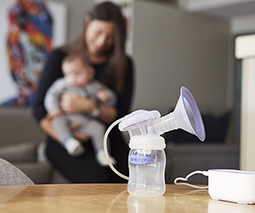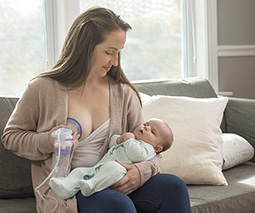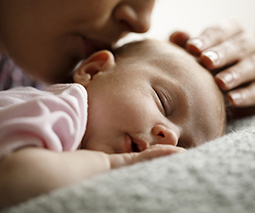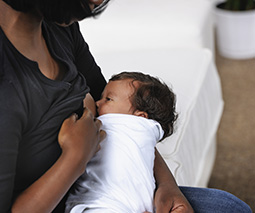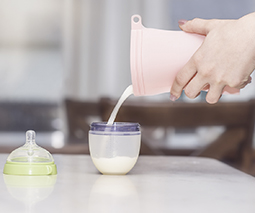Mums find solidarity sharing stories about breastfeeding struggles

The ABC’s Emma Race popped up on Twitter yesterday with a shout-out to mums who might be struggling to breastfeed their babies.
A life-saver
Emma was keen to start a conversation about the flip side of the ‘breast is best’ ethos, detailing her own experience as a brand new mum.
She explained that she went to great lengths in her quest to feed her first child, practically turning herself inside-out to make it happen.
But despite implementing a multitude of milk-encouraging strategies, she eventually turned to formula – and it was ultimately a really helpful turning point for her family.
“I had my first baby 9 years ago and I am still waiting for my milk to come in,” Emma half-joked on Twitter.
“Determined to breastfeed, I spent the first few years of motherhood anxious, self loathing, constantly pumping, eating brewers yeast and taking Motilium. Formula saved us all. Be kind to yourself mamas.”
“It doesn’t always happen”
As comments began to flow (no pun intended) in, Emma noted that at the time there was little chatter about the fact that breastfeeding might not come naturally – or even be possible – for some mums.
“I wished I’d seen more people discuss it when I was in it,” she admitted.
I had my first baby 9 years ago & I am still waiting for my milk to come in. Determined to breastfeed, I spent the first few years of motherhood anxious, self loathing, constantly pumping, eating brewers yeast & taking Motilium. Formula saved us all. Be kind to yourself mamas.❤️
— Emma Race (@Emsyanna) August 6, 2019
Other mums (and a few dads) shared their own tales of trying to breastfeed when things just were not coming together – and were kind of falling apart.
“After a massive postpartum haemorrhage I spent 6 months starving my baby thanks to the breastfeeding lobbyists,” one tweeter wrote. “No milk. No blood. Leave mums alone. We all know ‘Breast is Best’ but it doesn’t always happen.”
Mixed messages, guilt, depression
“I’m a twice failed breastfeeder. Guilt was HORRIBLE for first baby. Went easier on myself second time,” another mum shared.
After a massive post partum haemorrhage I spent 6 months starving my baby thanks to the breast feeding lobbyists. No milk. No blood. Leave Mums alone. We all know ‘Breast is Best’ but it doesn’t always happen. https://t.co/6JN3I04Ex0
— georgina mcencroe (@georgemcencroe) August 6, 2019
Breast is best / Fed is best
The ‘breast is best’ and ‘fed is best’ discussion often reaches fever pitch, but there are struggling mums and hungry babies behind the debate and those mums are often given little support if they decide a switch to formula.
The wellbeing of mums can very often get lost in (important) discussions about Big Formula and what’s optimal for babies.
“In a sense, none of this argues against the claim that “breast is best”. It seems it is best in terms of infant health,” author Emily Oster, author of evidence-based parenting book Cribsheet wrote in her piece questioning ‘is breast best?’ in The Guardian earlier this year.
“Where I think we run into complexity is in how we contextualise the size of the benefits, taking into account the fact that breastfeeding is difficult and may not be practical for all.”
Mums matter too
The research confirms that these difficulties can take a huge toll on new mums. A 2016 Liverpool University study of just over 1,600 new mums found that of the 890 who formula-fed their babies, 67 percent reported feeling guilty, 68 percent felt stigmatised and 76 percent felt the need to defend their feeding choice.
It’s not a great way to begin the parenthood experience, and not surprising that mums and dads are reporting that these feelings spark depression.
Hopefully, the winds of change are in the air, though.
In the UK, The Royal College of Midwives (RCM) issued a new position statement last year to try to ensure that mums who formula feed are being given advice, information and support.
“We recognise that some women cannot or do not wish to breastfeed and rely on formula milk. They must be given all the advice and support they need on safe preparation of bottles and responsive feeding to develop a close and loving bond with their baby,” RCM Chief Executive Gill Walton said.
Locally, AMA chief Michael Gannon also noted in 2017 that mums who formula feed need much more support.
“Discordance between the feeding intentions and actual feeding experience of a mother may increase the likelihood that she will experience PND, whilst women who are able to breastfeed in line with their intentions have a reduced risk of experiencing PND.”
“Parents seeking to bottle feed their infants need support and guidance,” Dr Gannon said.


